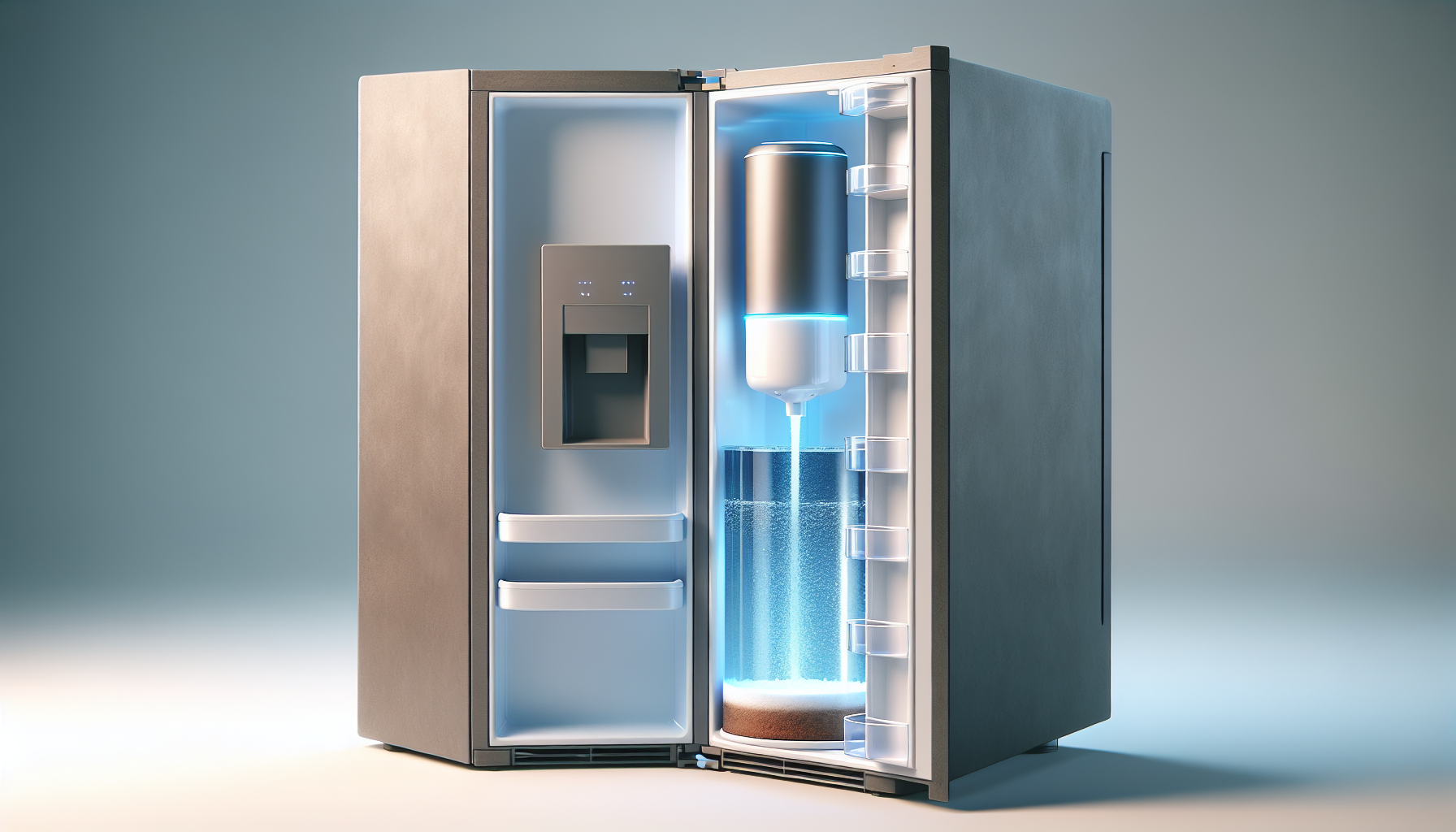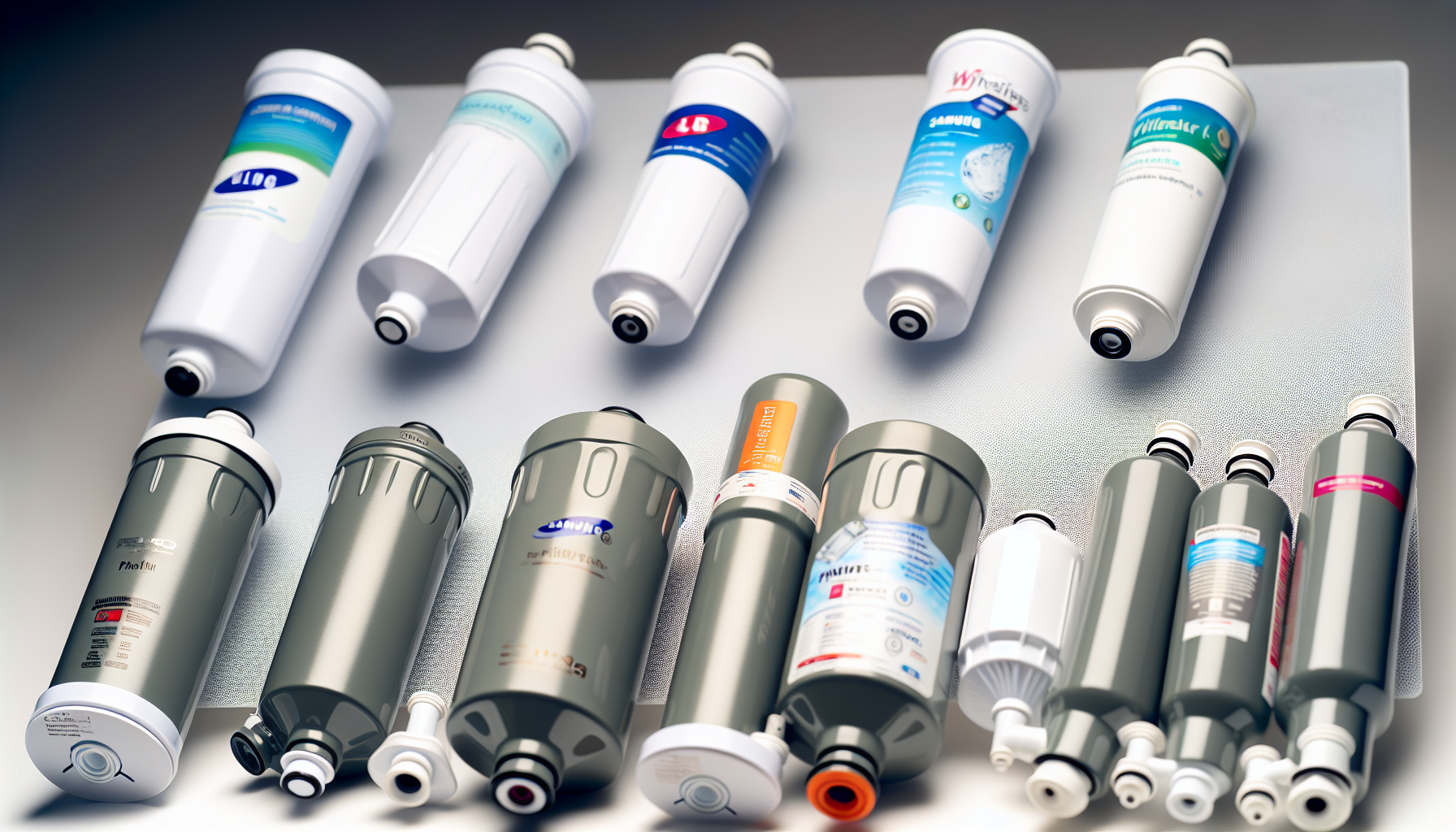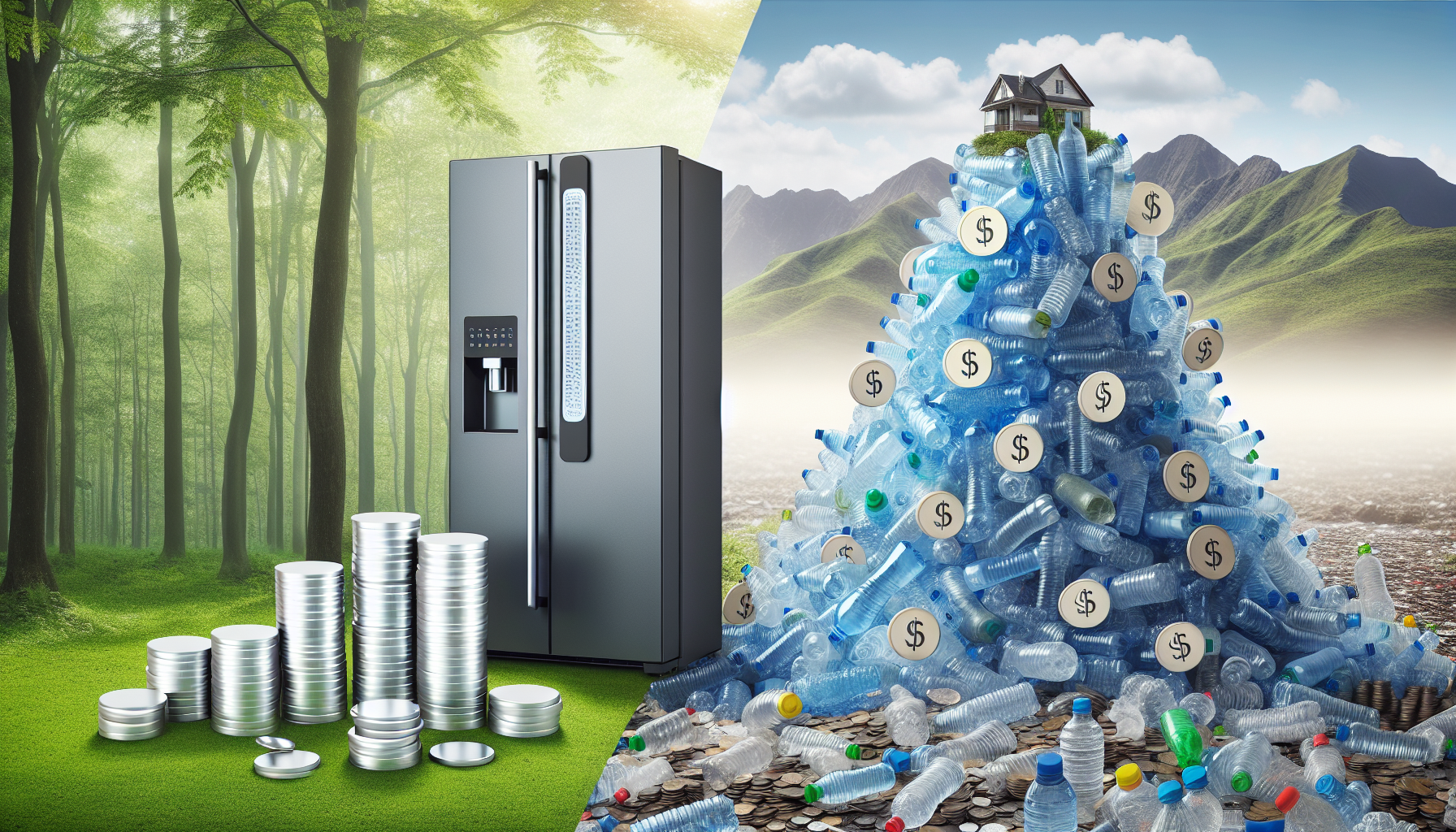Top Fridge Water Filter Options for Pure, Chilled Refreshment
Wondering how to keep your refrigerator’s water clean and tasting great? A quality fridge water filter is key. This guide cuts straight to the chase—what you need to know about choosing, replacing, and maintaining fridge water filters to safeguard your drinking water.
Key Takeaways
-
Fridge water filters improve drinking water quality by removing impurities such as chemicals, minerals, bacteria, and heavy metals, enhancing taste and safety.
-
To maintain efficiency, most refrigerator water filters should be replaced every 6 to 9 months, with signs like reduced water flow and odd tastes indicating the need for replacement.
-
Using a quality fridge water filter leads to significant cost savings and environmental benefits compared to bottled water, by reducing plastic waste and the financial and ecological costs associated with its production and disposal.
Understanding Fridge Water Filters

Fridge water filters are the unsung heroes of modern refrigeration. These devices, installed in numerous contemporary fridges, are designed to purify water before it’s dispensed or used to make ice. They ensure the water you consume from the fridge is clean, free from various contaminants, and safe to drink. Fridge filters capture a broad spectrum of impurities, including particles, chemicals, and heavy metals, making the water safer to drink.
Modern refrigerators are often designed with built-in water filtration systems, engineered to be compatible with specific filter models or universal types.
The Role of a Water Filter in Your Fridge
Fridge water filters significantly improve the quality of our drinking water. They:
-
Eliminate impurities that are not always caught by municipal treatments
-
Reduce unwanted chemicals and natural minerals that affect water’s taste and odor
-
Remove bacteria, organic and inorganic particles, heavy metals, and chemicals from water
Their ability to remove these contaminants promotes healthier living.
Using a fridge filter enhances water quality, diminishing unpleasant tastes and smells while heightening the natural flavors in food and beverages, thereby enriching your consumption experience.
How Fridge Filters Work
When it comes to purifying water, fridge filters employ a comprehensive three-stage process to reduce a variety of contaminants. The three stages are:
-
Particle-filtration: Larger sediments like sand and silt are physically trapped on the outside surface of the carbon filter.
-
Micro-filtration: Medium-sized contaminants, such as certain chemicals and cysts, are targeted as water flows through the carbon filter.
-
Adsorption-filtration: This stage further removes impurities by adsorbing them onto the surface of the carbon filter.
These three stages work together to provide clean and purified water for your fridge.
The final stage, adsorption-filtration, allows the activated carbon in the filter to absorb microscopic contaminants, including traces of pharmaceuticals and pesticides. This improves the taste and odor of the water. Filters are vital tools responsible for extracting impurities like heavy metals, pesticides, and residual chemicals from municipal water, guaranteeing safer drinking water.
The removal of chemicals and heavy metals from water by fridge filters can contribute to better health by reducing the risk of issues like cancer, cardiovascular disease, and nervous system harm. It’s impressive to note that refrigerator water filters commonly use advanced filtration technology such as charcoal or osmosis systems to purify the dispensed water.
When to Replace Your Fridge Filter
Being aware of when to change your fridge filter is vital for preserving its efficiency. Most refrigerator water filters are designed to last between 6 and 9 months under heavy use. Refrigerators typically feature an indicator light to alert homeowners when the water filter needs replacement.
Signs of a filter needing replacement can include:
-
A reduction in water flow
-
A peculiar smell or taste
-
The appearance of black specks
-
Cloudiness
-
Small ice cubes
-
Visible particles in water, indicating a clogged or failed filter
To prevent potential contamination, it’s advisable to follow the manufacturer’s guidelines for filter replacement, typically every 6 months.
The Best Fridge Filter Brands on the Market

Selecting a top-notch fridge filter is fundamental to guarantee the cleanliness of your drinking water. LG, Samsung, and Whirlpool are leading brands renowned for their high-quality fridge filters that enhance water taste and remove impurities. Whirlpool fridges, as well as other well-regarded brands such as Frigidaire and GE, are known for their range of effective and easy-to-install refrigerator water filters. However, the performance capabilities and expected lifespans of fridge filters can vary, so it is imperative to consult the guidelines for each specific brand and model.
LG Refrigerator Filters
LG refrigerator filters are engineered to deliver clear, fresh-tasting water and ice by minimising contaminants and impurities. The company offers a variety of filter models to fit different LG refrigerator styles, including French door and side-by-side fridges. This ensures that no matter the LG refrigerator model you own, there’s a filter designed to fit perfectly and function effectively.
Samsung Fridge Filters
Contrarily, Samsung fridge filters utilise a superior carbon block to proficiently reduce contaminants such as:
-
chlorine
-
microbial cysts
-
heavy metals
-
chemicals
These filters have been rigorously tested and certified by NSF International to confirm their ability to remove numerous contaminants.
Genuine Samsung water filter cartridges are recommended to maintain peak performance and are designed to fit specific Samsung refrigerator models, such as those with side-by-side and French door configurations. A Samsung fridge filter can purify up to 500 gallons of water before needing to be replaced, making them a reliable choice for your home.
Other Leading Brands' Fridge Filters
Other leading brands, such as Bosch, Maytag, and Fisher & Paykel, also offer high-quality fridge filters for their respective appliances, including Bosch fridges. Brands Australia’s Bosch fridge filters use Ultra ClarityPro™ technology to efficiently reduce contaminants such as lead, asbestos, benzene, and some pharmaceuticals while preserving beneficial minerals in the water.
Discover Maytag featured products, such as their refrigerator filters, which feature Triple Filtration Technology that employs activated carbon to effectively reduce a variety of contaminants and enhance the taste of the water.
Fisher & Paykel’s water filters, also known as Paykel filters, are specifically designed for their refrigerators, with filter cartridges that fit models starting with E402, E442, RF135, among others, ensuring optimal compatibility and performance. These filters not only ensure a proper fit but are also tailored to remove chemicals and other contaminants to provide cleaner, better-tasting and smelling water.
How to Find the Right Fridge Filter for Your Model
Buying a fridge filter is not a one-size-fits-all matter. It’s crucial to find the appropriate filter that aligns with your specific refrigerator model. And while this might seem like a daunting task, there are ways to simplify the process.
Fridge Filter Find: Identifying Compatible Filters
Finding the right water filter for your refrigerator can be determined by:
-
Noting the brand and specific fridge model number
-
Consulting the instructional manual, which is likely to contain the filter’s model number
-
Searching for OEM water filters, which are the original filters manufactured by the fridge company, using the fridge brand and model number
Online search engines for fridge filters allow users to simply enter their water filter’s model number to locate compatible options. If determining the water filter model number is difficult, customer service representatives from fridge filter websites are available to provide necessary assistance.
Brand Shop: Exploring Extensive Range Options
Once you have identified the right filter for your refrigerator, you can purchase it from brand-specific shops. These provide a guarantee of genuine replacement water filters. Shoppers can find filters from leading brands such as:
-
Samsung
-
Fisher and Paykel
-
Aqua Pure
-
Whirlpool
-
Everpure
Websites like Discount Fridge Filters give customers access to a variety of genuine filters, ensuring they can find the specific type they need for their refrigerator.
Universal vs. Brand-Specific Filters
When choosing a fridge filter, you will come across universal and brand-specific options. Each has its own pros and cons. Brand-name filters are specifically designed to fit and perform with the corresponding refrigerator brand and often come with a warranty. On the other hand, universal filters may not offer the same precise fit, possibly leading to leaks or reduced filtration performance. Universal water filters are adaptable and can be used with different refrigerator brands and models, reducing the need to purchase new filters with each refrigerator change, with some offering adjustable fittings for a variety of connection types.
However, aftermarket filters may raise concerns about their safety and filtration efficiency as some lack official certification, unlike OEM filters that come from the original fridge manufacturer. They are generally less expensive than OEM filters, but the price should not be the only consideration, as it’s important to verify their certification for safety and efficiency. Universal fridge filters may have different water capacities and PSI ranges than OEM filters, influencing their longevity and compatibility, although both types generally share the same temperature range, water flow rate, and basic capabilities for reducing contaminants.
Installation and Maintenance Tips for Fridge Filters

After acquiring your new filter, it’s paramount to understand how to correctly install and upkeep it. Proper installation and maintenance not only ensure your fridge filter functions optimally but also extends its lifespan.
Easy Installation Guide
Installing a new fridge water filter typically involves the following steps:
-
Remove the old filter.
-
Prepare the compartment for the new filter.
-
For filters like LG and Samsung, twist and pull out the old filter before installing the new one.
Note: Some filters may require additional steps or tools, so it’s always best to consult the manufacturer’s instructions for your specific model.
Some fridge filters, such as Aqua-Pure, Fisher and Paykel, and Everpure, might have an external housing requiring extra effort to change.
Keeping Your Fridge Filter at Peak Performance
Regular maintenance can extend the lifespan of your fridge filter, influenced by the frequency of use and the specific brand of the filter. Maintaining a clean water filter contributes to the overall energy efficiency of the refrigerator by reducing strain on its internal components.
Reduced energy consumption and maintenance costs are benefits associated with keeping the fridge filter clean, which ensures smooth operation and prolongs the longevity of the refrigerator.
Troubleshooting Common Filter Issues
Despite our best efforts, problems can sometimes occur with fridge filters. Here are some common issues and how to resolve them:
-
Unusual noise after filter installation can be resolved by ensuring no air bubbles are trapped. To do this, dispense water for several minutes or recheck the installation.
-
Leaks around the filter can be fixed by ensuring O-rings and gaskets are in good condition and properly seated. After making adjustments, test for leaks.
-
If water sprays or leaks after installing a new filter, ensure it’s fully secured and locked in place correctly.
Slow or no water flow issues can be addressed by following these steps:
-
Turn off the water supply.
-
Remove the clogged filter to inspect, clean, or replace it.
-
Avoid attempting to clean or backflush refrigerator water filters, as this can damage the filter and allow contaminants through.
-
After replacing a fridge filter, use a reset button or process to clear the ‘change filter’ indicator according to the owner’s manual instructions.
Always follow the manufacturer’s manual or guides for steps to resolve problems like reduced water flow, bad taste or smell, and water leaks.
Health Benefits of Using a Quality Fridge Water Filter

The advantages of utilising a fridge water filter include:
-
Supplying clean, fresh-tasting water
-
Removing harmful substances such as chemicals like fluoride and chlorine, heavy metals, and contaminants from pesticides
-
The use of coconut shell activated carbon in refrigerator water filters highlights their superior ability to remove impurities, given its larger surface volume of tiny pores ideal for filtering out chlorine and iron.
Water filters offer several benefits, including:
-
Improving the taste of water
-
Extending the lifespan of appliances
-
Supporting personal health by treating and aligning water quality with health standards
-
Reducing exposure to chemicals associated with health conditions such as breast cancer, which can be found in alternative options like bottled water.
The Connection Between Water Filters and Body Wellness
Fridge water filters serve as a protective barrier between your body and harmful contaminants. They can reduce a variety of harmful contaminants including:
-
chlorine
-
lead
-
mercury
-
pesticides
-
pharmaceuticals
By filtering out these contaminants, water filters contribute to protecting the body from their potentially harmful effects.
Thus, using filtered water for consumption may help in reducing potential healthcare costs by mitigating the risk of waterborne illnesses.
The Impact of Clean Water on Taste and Hydration
Filtered water does more than quench your thirst; it enhances your drinking experience. Refrigerator water filters can:
-
Eliminate bad tastes and odors from drinking water, which can result from chemicals and natural minerals present in too large quantities.
-
Remove chemicals, heavy metals, and other toxins in water through filtration.
-
Result in a purer, cleaner, and more refreshing taste.
With no odd smells or chemical clouds, filtered water is more appealing to drink, potentially improving hydration habits.
Cost Analysis: Investing in a Fridge Water Filter

Investing in a fridge water filter is not just about ensuring clean, safe drinking water; it’s also a smart financial decision. Switching from bottled water to a refrigerator water filter can lead to substantial savings over time, considering the expenses of single-use plastic bottles.
A quality refrigerator water filter can offer extended filter life, reducing the frequency of replacement water filter purchases and associated costs.
Initial Investment vs. Long-Term Savings
Despite the upfront cost of a premium refrigerator water filter, such as the Whirlpool Filter EDR1RXD1, for uninterrupted access to purified drinking water, the enduring financial returns are valuable. Buying refrigerator water filters in bulk can result in significant cost savings, as they do not expire when kept dry and stored properly.
The long-term financial benefits of using a fridge filter include reduced expenses in replacements compared to other water purification methods. Furthermore, investing in a fridge water filter eliminates the need to purchase bottled water frequently, delivering added convenience and cost savings over time.
The Environmental and Financial Costs of Bottled Water
Although bottled water might appear as a convenient choice, it carries substantial environmental and economic implications. Some of the reasons why bottled water is not a sustainable option include:
-
Bottled water production involves significant consumption of non-renewable fossil fuels
-
It requires substantial water usage and can contribute to ecological disturbance from the extraction of spring water
-
Manufacturing plastic bottles for water in the United States annually uses over 17 million barrels of oil, contributing to pollution and resource depletion
-
Plastic bottles often end up in landfills or the environment due to low recycling rates, taking hundreds of years to decompose and causing lasting pollution
Considering these factors, it is important to explore alternative options for accessing clean and safe drinking water, even in countries like Australia.
Bottled water can be up to 2000 times more expensive than tap water, with significant markups when sold by private companies drawing from public sources. By reducing single-use plastic consumption, fridge water filters offer long-term financial benefits and promote sustainable environmental practices.
Summary
In conclusion, investing in a high-quality fridge water filter offers numerous benefits. From ensuring the water you drink is clean and safe, to enhancing the taste of your water and food, to contributing to a healthier lifestyle, and finally, offering long-term financial and environmental benefits. Whether it’s LG, Samsung, Whirlpool, or any other leading brand, choosing the right fridge filter for your refrigerator model and maintaining it properly will ensure you reap these benefits for years to come.
Frequently Asked Questions
Are refrigerator water filters worth it?
Refrigerator water filters can effectively remove certain contaminants like lead, chlorine, and volatile organic compounds, improving water quality and taste. However, if your goal is to remove a wider range of contaminants, such as arsenic and pharmaceuticals, a refrigerator water filter may not meet your requirements.
Do I really need to change the water filter in my refrigerator?
Yes, changing the water filter in your refrigerator is necessary to ensure the drinking water supply remains free of pollutants, parasites, and unwanted molecules. The lifespan of the filter depends on the brand and frequency of use.
Is it OK to use fridge water without filter?
It's not recommended to use the fridge water without a filter as it may decrease water and ice quality and shorten the fridge's life. Filtered water is clearer and tastes better than unfiltered water.
How long do water filters last in refrigerator?
You should replace your refrigerator water filter every 6 months to ensure clean and fresh-tasting water for your family. Using a filter beyond its capacity can lead to harmful water quality.
How do fridge water filters work?
Fridge water filters work through a three-stage process involving particle-filtration, micro-filtration, and adsorption-filtration to reduce contaminants. This process helps ensure the water from your fridge is clean and safe to drink.
























